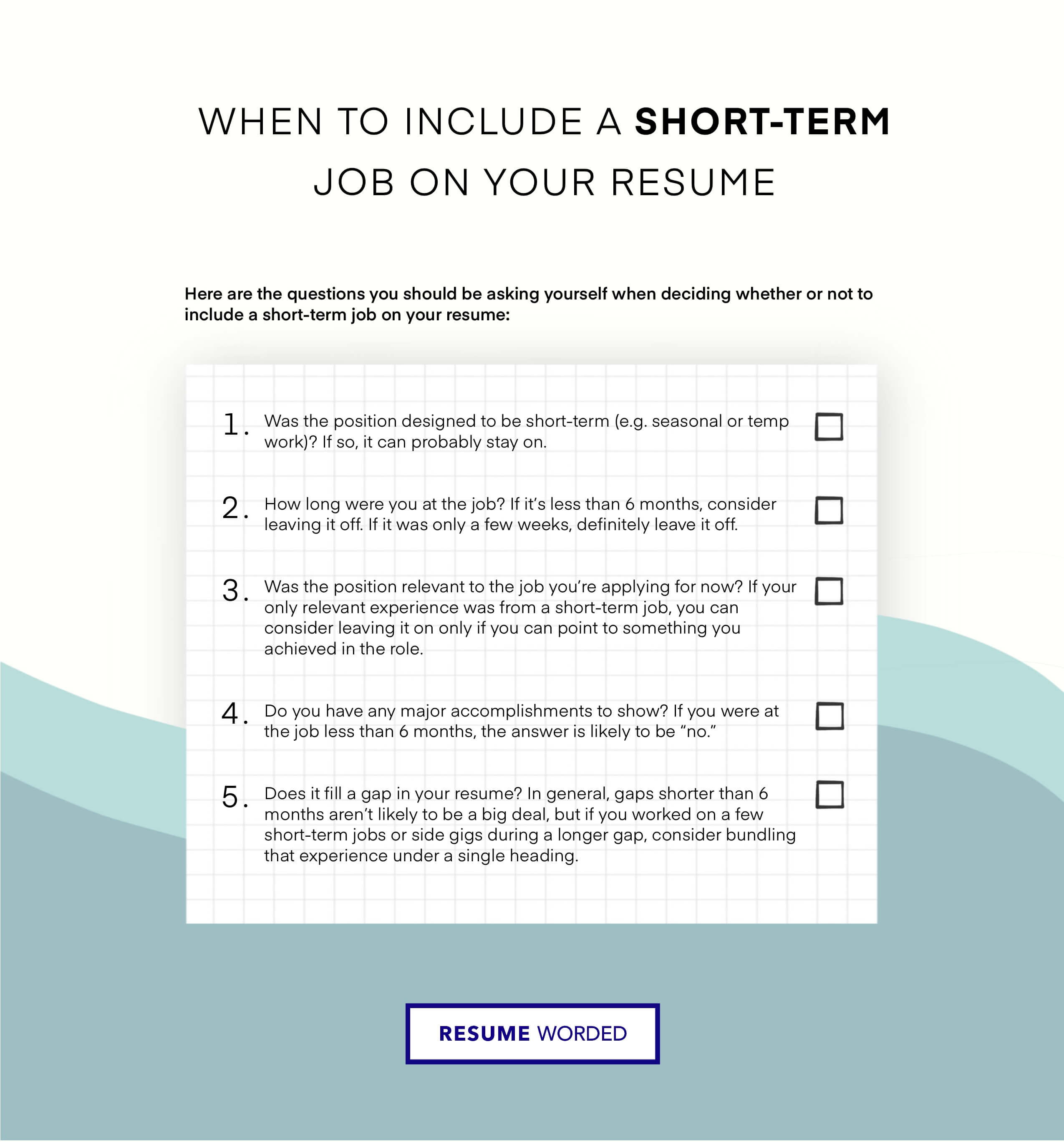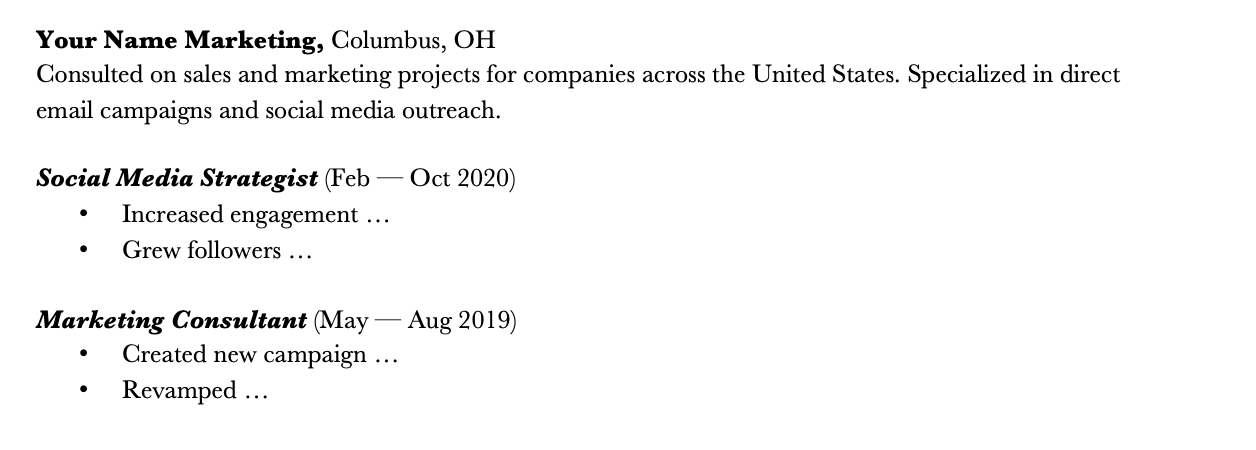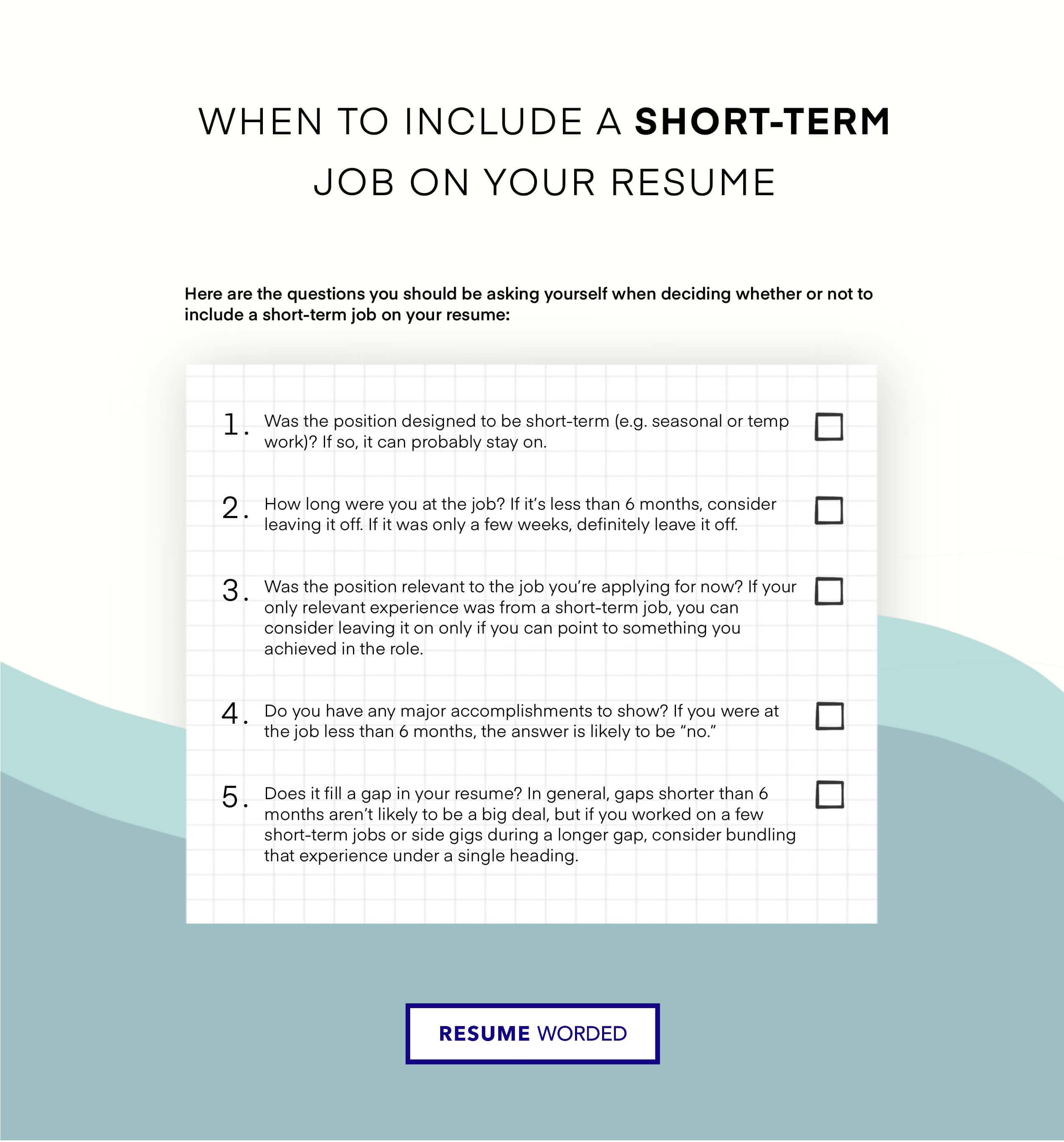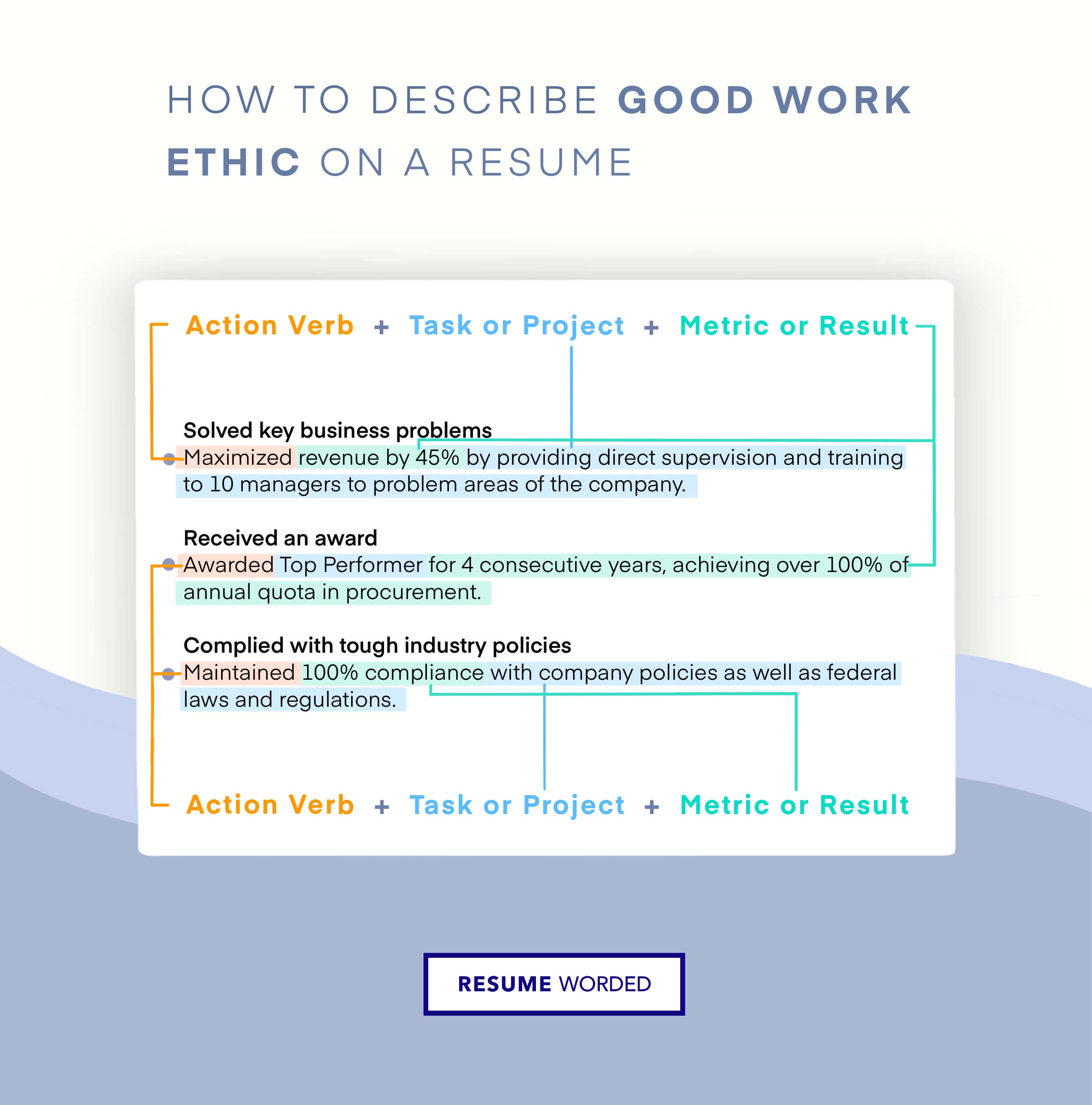All experience is good experience, right?
Not when it comes to short-term jobs.
While you might have learned a lot from your two-week stint in customer service or the month you spent at a company before deciding it wasn’t the right fit, that doesn’t mean those positions belong on your resume. The first rule of resume writing is to only include something if it makes you a more appealing candidate — and in most cases, that means leaving short-term jobs off your resume.
When to leave a short-term job off your resume
Let's start with some blanket guidelines for when to leave a short-term job off your resume. Don't include a short-term job on your resume if:
- You held the job for less than 6 months
- You don’t have any relevant accomplishments to list
- The job was in a completely different role or industry
- It’s a much older position, e.g. part-time jobs from when you were a student or entry-level jobs when you’ve had significant experience since then
- You were fired or left early on bad terms
When to keep a short-term job on your resume
Leaving short term jobs off your resume isn’t a hard and fast rule. There are some exceptions when it’s appropriate to include a short-term job on your resume:
- Seasonal jobs, especially if you’re still studying and worked full-time over the summer
- Temporary, contract, or freelance work
- Any other position that was explicitly designed to be short-term
If you’re not sure how effective your short-term jobs are on your resume, upload it to the tool below — it’ll give you a detailed review of your jobs and accomplishments and suggest which ones to improve or remove.
How to decide what jobs to leave off your resume
Still undecided? Here are the questions you should be asking yourself when deciding whether or not to include a short-term job on your resume:
- Was the position designed to be short-term (e.g. seasonal or temp work)? If so, it can probably stay on.
- How long were you at the job? If it’s less than 6 months, consider leaving it off. If it was only a few weeks, definitely leave it off.
- Was the position relevant to the job you’re applying for now? If your only relevant experience was from a short-term job, you can consider leaving it on only if you can point to something you achieved in the role.
- Do you have any major accomplishments to show? If you were at the job less than 6 months, the answer is likely to be “no.”
- Does it fill a gap in your resume? In general, gaps shorter than 6 months aren’t likely to be a big deal, but if you worked on a few short-term jobs or side gigs during a longer gap, consider bundling that experience under a single heading.

Why you should leave short-term jobs off a resume
What’s the harm in including short-term jobs on your resume? These are the potential drawbacks of listing short-term jobs.
Listing too many short-term jobs on a resume can make you look like a job hopper
In general, you should be aiming for stays of at least 2-3 years in most jobs that you include. One or two shorter stays in a larger context of longer commitments should be okay, but listing several short-term jobs will make most recruiters wonder if you’re likely to leave this job after only a few months, too.
It can raise red flags about why you left
Your reason for leaving a job plays a big role, too. Were you fired? Did you quit without notice? Would you rather quit than work through issues in your current workplace? While having one or two short-term jobs on your resume is unlikely to be a dealbreaker on its own , it may give the hiring manager pause — and if there are other candidates with similar backgrounds but better job histories, that may be enough reason not to move you forward.
Short-term jobs are unlikely to add anything to your resume
Remember that your resume isn’t a complete history of your professional experience, but rather a story about why you’re a good fit for this particular job. That means only including information that highlights relevant skills or accomplishments, which you’re unlikely to have developed in only a few months while you were still learning the ropes.
How to include short-term jobs on your resume
Decided to list one or more short-term jobs on your resume? Here's how.
Contract or temporary work
Quick How To: If you’ve held more than one or two contract or temporary positions, you can list these under a single header on your resume to keep things organized and avoid the appearance of job hopping.
Detailed Guide: The Right Way To List Contract Work on Your Resume
Freelance work
Quick How To: Give yourself an official company name and job title — this will help legitimize your freelance work. Group different projects or clients underneath this heading, with individual dates and bullet point accomplishments.
Detailed Guide: Everything You Need To Know About Listing Freelance Work on a Resume

Multiple jobs at the same company
Quick How To: If you've bounced around to a few different roles within the same company, avoid confusion by listing these all under the same company heading. You can choose to list your accomplishments separately or together (depending on how similar the roles were) — and don't forget to explicitly highlight any promotions in that period.
Detailed Guide: How Do You List Multiple Positions at the Same Company?

How to rehab your resume if you have a lot of short-term jobs
Do you have a lot of short-term jobs that don't neatly fit into the categories above? Here's how to fix a spotty work history.
List only the years of employment
It isn't an absolute requirement to list months on your resume — in fact, many people don't. It's totally fine just to list years on your resume as long as it doesn't significantly misrepresent your background — for example, don't list a six-week job from December 2022 to January 2023 as "2022-2023," but you can list a job you held from March to October 2022 as simply "2022."
Leave jobs off your resume strategically
Similarly, if you held more than one job in a single year, it's often better to list just one of them. If recruiters see multiple jobs listed over a 1-2 year period, they may wonder what's up, whereas listing one or two jobs over the same timeframe will raise fewer concerns — even if there's a small gap in between some of them.
Embrace the resume gap
Having a gap on your resume isn't the big deal it used to be. One or two gaps of less than 6 months aren't likely to be a big deal — in fact, leaving a gap on your resume may look better than trying to cram in any short-term jobs you held over that period. If you're asked in an interview about what you were doing during that time, you can mention any short-term jobs then and explain (if necessary) that you left it off your resume because you didn't feel that it was relevant.
Listing short-term jobs on a resume vs job application
Does this mean you should leave a short-term job off your application, too? Not necessarily.
It's common for job applications to ask for a complete job history. In that case, you should include every job you’ve ever held on a job application — even the very short-term ones.
That doesn’t mean you need to go back and put those jobs on your resume. You’re unlikely to need to explain leaving jobs off your resume, but if you’re asked about the difference between your resume and application, here’s a simple script you can use:
“I wanted to focus on more relevant experience on my resume, for example my [X years of experience / relevant skill set / recent accomplishment].”
Frequently asked questions
Should you include your current job on your resume?
If you’ve only been at your current job for a few months, you generally shouldn’t include it on your resume. The exception to this is if you have a major enough accomplishment that it’s worth the trade-off. In this case, be prepared to give a short explanation of why you’re leaving if you get to the interview stage — not on your resume. It’s okay to mention that the position was a bad fit or that it focused on X when you’re looking for Y (when Y is something you’d be doing in the new role), but stay away from discussing interpersonal conflicts or badmouthing your current company.
How soon is too soon to leave a job?
That depends on a number of factors, but in general, you should weigh up how badly you want to leave vs how important it is to have a longer stay on your resume. If you've been at most of your previous jobs for a few years, it's not a big deal to leave this one early. On the other hand, if you have a string of shorter jobs under your belt, you may want to stay for at least 2-3 years to show that you're capable of staying longer at a job.
Related: Being Scared To Leave A Comfortable Job Is Natural, But Don’t Let That Stop You
How bad is job hopping?
Not as bad as it used to be. Employees are increasingly realizing that the best way to make more money is to leave and get a new job, which means that job hopping is becoming more mainstream. Even so, a lot of recruiters (especially the more old-fashioned ones) will still balk at it, so be prepared for the consequences if you choose to follow this path.
Is it lying to leave a job off your resume?
Not at all! As a job seeker, you can do whatever you like with your resume, including leaving off information if it isn’t relevant, doesn’t help your candidacy, or you’d rather keep it private. Recruiters (and successful job seekers) understand that your resume is a marketing tool, not a complete background of your work history.










